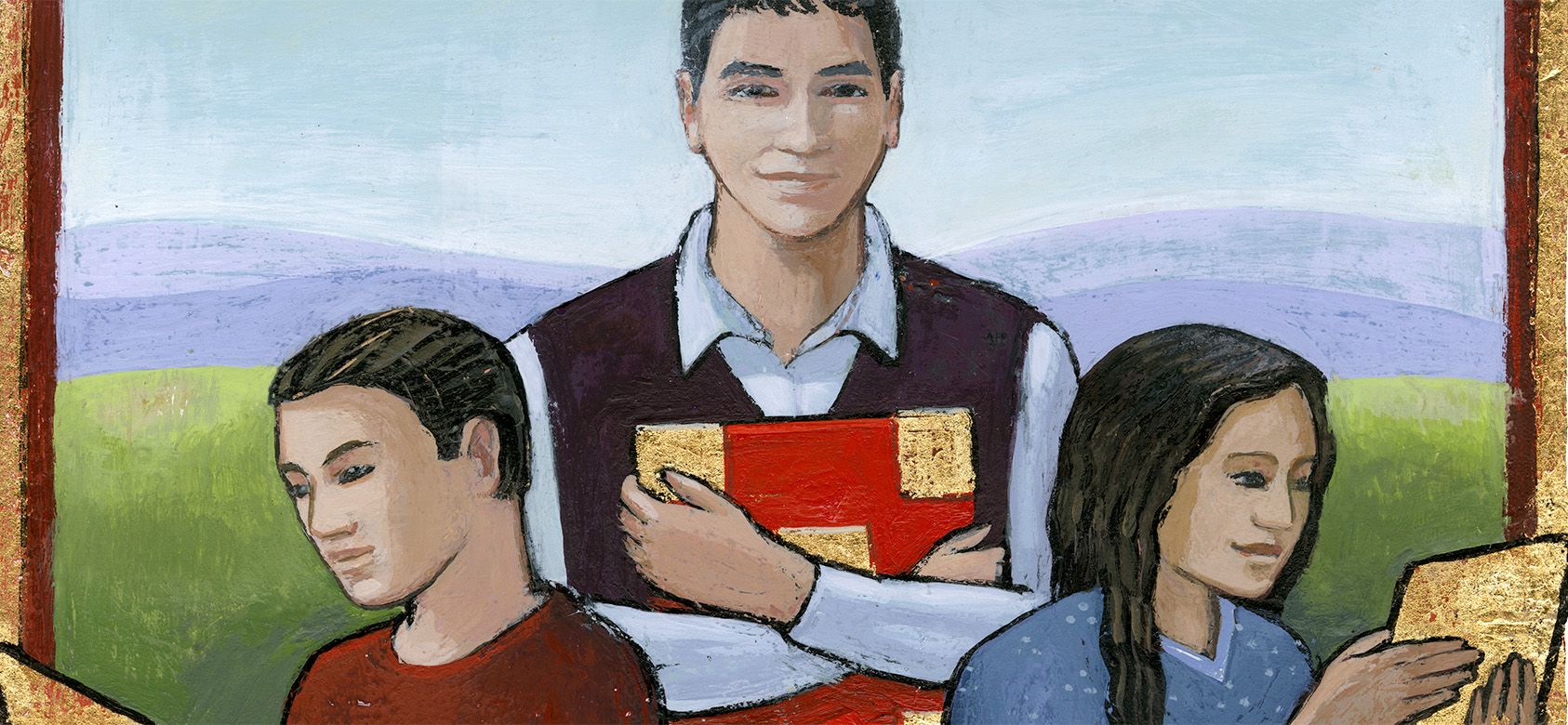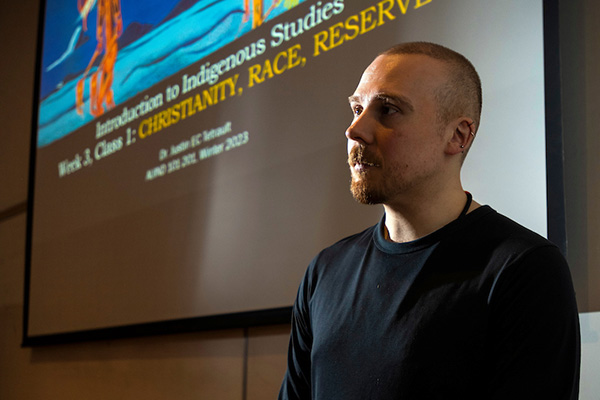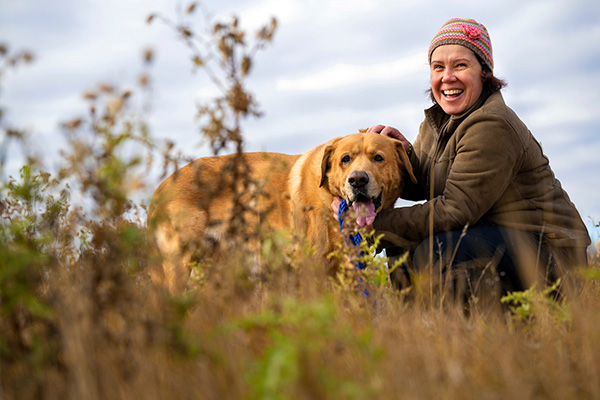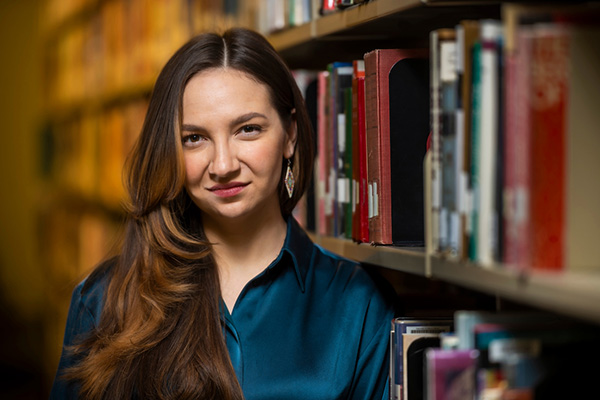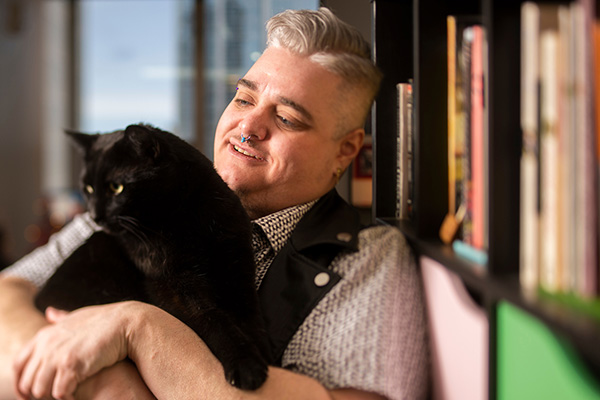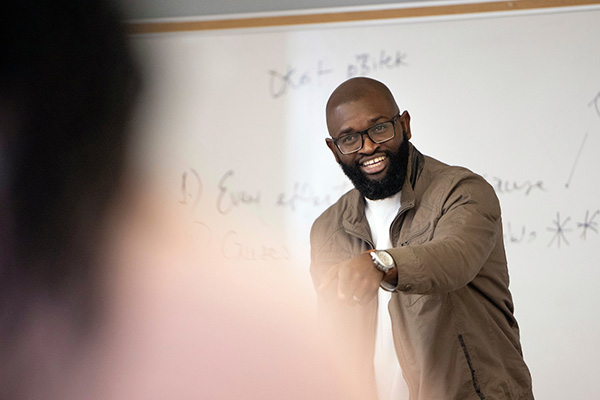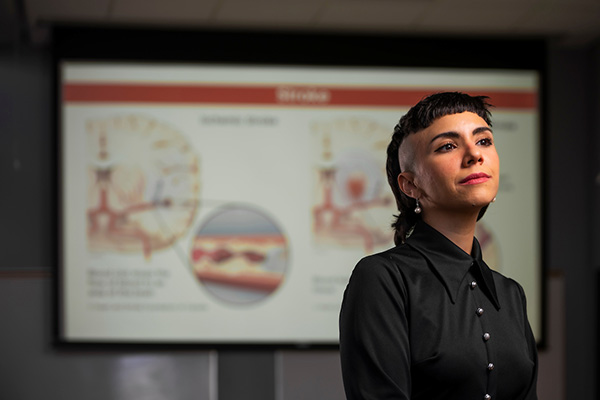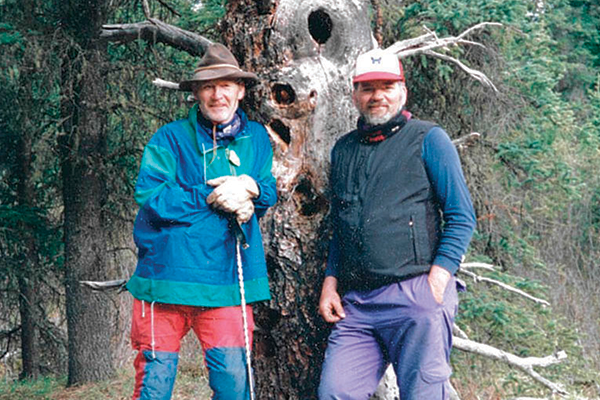Message from the Dean
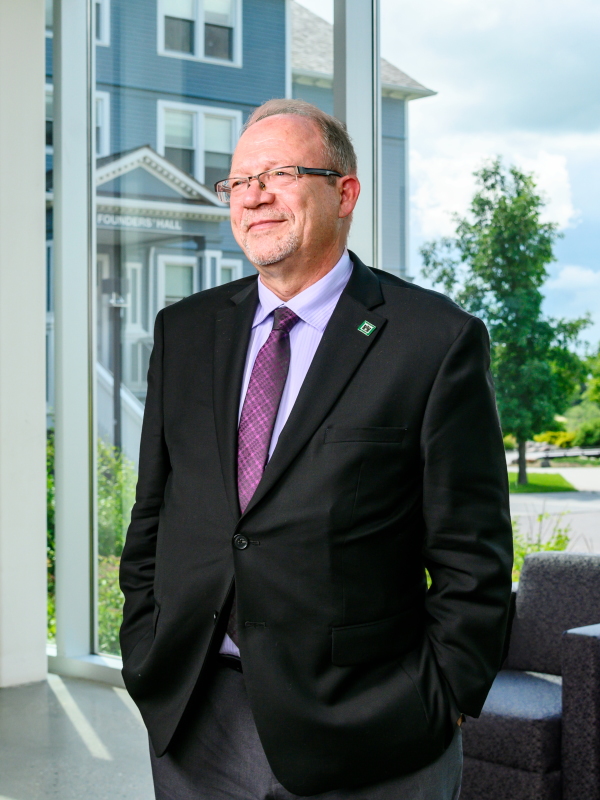
WELCOME TO this issue of Circle, your Augustana Campus alumni magazine. I am certain that everyone who reads this exciting and informative publication may share our pride in the many accomplishments of our Augustana community.
To live up to our role as “a living laboratory for teaching and learning innovation,” we depend on the work of our outstanding faculty. Over the past 18 months, we have been able to attract colleagues because they know that they’ll find mentors, various opportunities and funding to continue their exciting work. Among these are seven new professors who work in a wide range of fields in the humanities, social sciences and sciences — I hope you will enjoy getting to know these new additions to our campus.
In the last several years, academic appointments have seen the arrival of several young scholars who are doing wonderful work in their areas. This year’s magazine features two young, promising, sensational scholars who credit some of their successes to the interdisciplinary nature of our campus, the diversity of our students, and the ways in which the Augustana experience benefits their work. Take a look at Brandon Alakas’s research on a group of Medieval nuns and how their religious practices of the Middle Ages resonate today. Then read about Mi-Young Kim’s use of the latest advances in AI to provide medical and legal advice to people in a way that is easily understandable. You will find that Augustana faculty are conducting cutting-edge research that befits a Top 5 university in Canada.
Circle also includes stories about you, our alumni. I remain inspired by the leadership displayed by our graduates — like Fowzia Huda, who is making a difference by “working with people and not for them” — and how they are creating a better world by serving their communities.
Finally, we have been fortunate to be back in person on campus and in the classroom. We are once again able to enjoy all the wonderful and energizing events we have missed for more than two years. Plus, there are even more ways for us to connect with hybrid event delivery and events like our Alumni Day at the Game. Reflecting on the past year, I am so very proud of the many accomplishments of our Augustana community. We have a lot to celebrate and a lot to look forward to.
Thank you for your interest in Augustana Campus, for your continued engagement and for your dedication to our university. I hope this magazine offers an opportunity to reminisce and discover more reasons to be proud of your alma mater.
Demetres P. Tryphonopoulos
Dean and Executive Officer
Augustana Campus
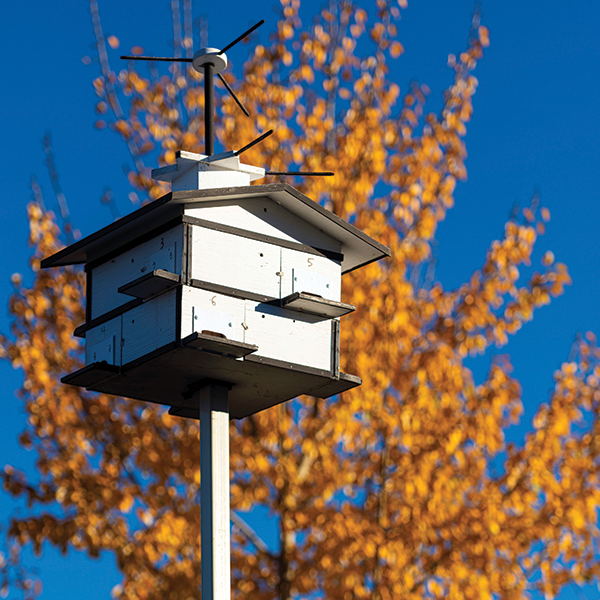
For the Birds
Purpose-built housing on campus and in Camrose proves popular for purple martins
Thanks in part to Glen Hvenegaard, purple martins, North America’s largest swallow, return from South America each year to a specifically designed type of nestbox, of which there are now about 100 in Camrose, including the one on campus pictured above. Hvenegaard is an environmental science professor at Augustana, a founder of the Camrose Wildlife Stewardship Society and an organizer of the Camrose Purple Martin Festival. Purple martins are dependent on humans for housing and aspects of care, despite the fact that they’re wild. With the CWSS, Hvenegaard has lectured about the birds and their care and increased the number of people who are willing to host the birds as “landlords.” – MIFI PURVIS
Research Improves Justice System
SOCIOLOGIST SANDRA BUCERIUS Sociologist Sandra Bucerius is leading a team to examine systemic problems across Canadian criminal justice institutions to make evidence-based recommendations for reform. The research addresses “long-simmering concerns about police violence, pains of imprisonment, gendered and racial victimization and the denial of fundamental civil liberties,” says Bucerius.
The project received $2.5 million in federal funding through a Partnership Grant from the Social Sciences and Humanities Council of Canada. The team includes United Way and academic experts on Canadian court and prison systems, such as U of A scholars Jana Grekul, Temitope Oriola, Kevin Haggerty and Augustana professor Justin Tetrault. They examine how elements of the justice system — police, courts, correctional facilities — further marginalize Indigenous peoples, impoverished Canadians, Black Canadians and the queer and trans community to create a “cumulative disadvantage in the Canadian justice system,” Bucerius says. – GEOFF MCMASTER
An Exercise in Hope
DIABETES RESEARCHER Jane Yardley is exploring how exercise affects postmenopausal females with Type 1 diabetes, with the goal of providing better guidelines to
help them stay healthy. This research addresses significant gaps in knowledge. Everything from medications to diseases operate differently in female bodies, but females make up only about a third of research participants.
There are existing guidelines for how to manage diabetes while exercising, but they are based on studies that don’t include older women. “A lot of our guidelines look at the physiology of young fit males and then give blanket recommendations that don’t take into account why people are exercising,” says Yardley, associate professor of physical education at Augustana Campus and member of the Alberta Diabetes Institute.
Yardley’s hypothesis is that postmenopausal females may see their blood sugar drop faster than younger females, because estrogen allows the body to burn more fat as fuel and rely less on blood sugar. While it could be years until Yardley has the complete picture, she hopes guidelines can be refined enough to make it easier for older women to stay fit — and live longer, happier lives.
Yardley’s research through the Alberta Diabetes Institute is funded by the Heart and Stroke Foundation of Canada, and supported by the Alberta Women’s Health Foundation through the Women and Children’s Health Research Institute. (Diabetes Canada recently named Yardley as one of five U of A researchers to receive funds through the End Diabetes Awards research competition. Her research receives
$100,000 annually for three years.) “People with Type 1 diabetes can live 10 years longer if they exercise regularly, with a lower risk of heart disease and depression and a higher quality of life,” says Yardley. “It’s so important to remove as many barriers as possible.” – GILLIAN RUTHERFORD
"Today Could Be the Last Day"
Igor Klymenko came from Ukraine thanks to funding available for Ukrainian students
LAST YEAR, IGOR KLYMENKO was huddled alongside his family in a basement in Ukraine, hearing explosions overhead as Russia dropped bombs. The teen vowed to do something, which meant finishing a drone project he’d started in high school. “I realized I shouldn’t stop working on my device, because today could be the last day,” the 17-year-old recalls.
The eventual result of Klymenko’s work, a prototype to detect landmines, earned him the $100,000 Chegg.org Global Student Prize for his innovation, and landed him at the University of Alberta’s Augustana Campus. He was drawn to the U of A for its Ukrainian community and the opportunity to work at the university’s research facilities.
He’s determined to get the education he needs to finish the drone, which uses metal detectors to find landmines and transmit the co-ordinates to the operator. This work could save thousands of lives in Ukraine and more than 60 other nations struggling to mitigate landmines, he says. “I can save lives by creating this device.”
Once his invention is certified by Ukrainian authorities, Klymenko will share it with his country for mass production. In the meantime, he says: “I’m far away from my home and my family, but I’ve found a lot of new people who have become my small Canadian family.” – BEV BETKOWSKI
Ronning Centre Roundup
LAST SUMMER SAW THE APPOINTMENT of Joseph Wiebe as the interim director of the Chester Ronning Centre for the Study of Religion and Public Life. In October, Weibe published an op-ed in the Edmonton Journal about why religion needs to be on Canada’s census, and another in December about the intersection of sports and religion at the World Cup. He’s also a blogger and podcaster.
“The Ronning Centre is positioned to become the place to study religion at the university as a whole,” he says. “During COVID-19, we expanded the centre’s reach through online events. We had some of the biggest attendances, virtual or in-person, the U of A has ever had. We want to learn from the lessons during the pandemic.”
Upcoming Ronning Centre in-person events include a presentation by Muslim writer and convert, G. Willow Wilson. Wilson relaunched the Ms Marvel series on Disney+. On March 20, she’s talking about the importance of religious representation in popular culture.
Finally, the Ronning Centre is recruiting for a postdoctoral fellow who’ll build their professional network by organizing a conference or workshop around a theme of their choice. The format is open to the recruit’s discretion, and they’ll work closely with the centre’s program co-ordinator to identify participants. Together, the postdoc and staff at the centre will organize public lectures, workshops, student discussion forums or similar events. During their term, the postdoc will have the opportunity to teach at Augustana in an area related to their research interest. – SYDNEY TANCOWNY
A Voice for Health and Happiness
How to lose the fear and discover the benefits of singing
EVERY WEEK, AUGUSTANA'S SingAble choir brings together community members of all abilities and ages, from six months to 86 years old, including adults with developmental disabilities and their caregivers. Ardelle Ries, ’83 BMus, ’98 MMus,’04 DMus, is passionate about the health benefits of communal singing. As founding director of SingAble and a professor of music at Augustana Campus, she also knows why it’s not always easy to pick up the karaoke mic. In childhood, many people have already been in situations where “good” singers are separated from the “bad.” Ries has tips on how to lose the fear and discover the benefits of singing. – KATE BLACK, ’16 BA
DITCH THE JUDGMENT
The first step to bringing more singing into your life might not be enrolling in voice lessons to perfect your pitch. You can start by challenging the lie that you’re not talented enough to sing in the first place. “Leap and release judgment,” Ries says. “The voice you have is so intimately connected to the person that you are.”
RING OUT
The deep breathing in singing improves cardiovascular and respiratory health. Research shows singers have higher levels of germ-fighting immunoglobulin, Ries says. One study found less cortisol in people’s saliva after they sang a song. “We’re producing the sound within our body,” she says. “That makes singing one step more beneficial than playing an instrument.”
JOIN A CHOIR
Find a community or “inclusion choir” like SingAble that brings people together to experience the joy of singing without the pressure of auditions. Singing with others, Ries says, makes us better listeners, which deepens our emotional intelligence. We become much better attuned to other people’s feelings, ideas and needs.
The Data that Matters
EARLY IN HER CAREER, Paula Marentette struggled to apply what she’d learned in her university statistics courses to real-life data her boss placed in front of her. Thirty years later, she has created a new course to ensure Augustana students can take classroom learning straight to the workplace.
Marentette’s Introductory Applied Statistics course moves away from the traditional approach of memorizing formulas and manually calculating statistics from preset problems. Instead, students work in groups to pick a real-world problem, choose variables they’re curious about and explore their questions using large datasets of existing research from the University of Alberta Libraries.
The strategy challenges students to become critical thinkers in a world “awash in data,” says Marentette, a social sciences professor. “On social media, people are throwing data at you as evidence to support their version of the world. As university-educated people, we should have the capacity to think critically about that, and not take all statistics at face value.” Knowing how to research and explain statistical data gives Augustana students a deeper understanding of their value to employers, Marentette says. “Critical, complex thinking and problem-solving is what a university graduate brings to the workplace.” – BEV BETKOWSKI
Forward Together
A NEW PROJECT aims to bring land-based learning experiences to Indigenous K-12 students though Augustana’s Miquelon Lake Research Station and Hesje Observatory.
It’s becoming vital to recognize the importance of Indigenous perspectives — and students — to a field grappling with increasingly complex challenges, says project lead Glynnis Hood ’07 PhD, an environmental science professor and vice-dean at Augustana Campus.
“There’s a clear connection between Indigenous cultures to the land and to the environment,” she says. “Having Indigenous perspectives in science, technology, engineering and mathematics (STEM) fields is really important.”
Funded by a Natural Sciences and Engineering Research Council of Canada PromoScience grant, the three-year project draws on the expertise of Indigenous partners First Nations Technical Services Advisory Group, Future Ancestors Services and the Louis Bull Tribe, working with the U of A’s Centre for Mathematics, Science and Technology Education, Augustana Indigenous Student Services and the Beaver Hills Biosphere Association.
“Indigenous students who take part in the programming can feel connected between their own experiences, cultures and the sciences, have fun and see that they have a place in STEM fields,” Hood says.
The initiative also gives teachers, scientists and other professionals the chance to become students themselves, says Samantha Matters, ’14 BSc, ’14 Cert(CSL), of Future Ancestors Services. The project holds potential to further Calls to Action from the Truth and Reconciliation Commission of Canada, specifically around developing culturally appropriate education programs for Indigenous youth and educating teachers, Matters says.
“We want to create a long-standing linkage,” Hood adds, “that makes a meaningful experience for Indigenous students and communities, and moves us all forward together in partnership.” – BEV BETKOWSKI
Growing Resilience
OVER THE NEXT TWO YEARS, researcher Rebecca Purc-Stephenson is leading a series of studies to identify the biggest stressors affecting Alberta’s farmers and their families — and what can be done to help. Poor mental health in the agricultural community “has been an issue for a long time,” says Purc-Stephenson, a psychology professor and research associate with the Alberta Centre for Sustainable Rural Communities at Augustana Campus.
With livelihoods that can be threatened by weather, plant or livestock disease, rising operational costs and other factors, farmers face high rates of depression and stress, leaving them vulnerable to suicide, she says. The research will explore needs, gaps and challenges in mental health service delivery identified by farmers and mental health workers. Purc-Stephenson aims to shift the culture, so farmers recognize mental health is just as important as their work.
The research is in collaboration with the Agriculture Research and Extension Council of Alberta (ARECA) and supported by $524,500 in funding awarded to the group by Alberta Agriculture, Forestry and Rural Economic Development, through the Canadian Agricultural Partnership. A postdoctoral fellow will help Purc-Stephenson with the research, along with Augustana students. “Our campus is surrounded by rural communities and many of our students have lived on farms, so their involvement is important,” says Purc-Stephenson. – BEV BETKOWSKI
2022 Alumni Awards Winners
DISTINGUISHED ALUMNI AWARD
Judge Bill Andreassen, ’75 CLC, ’76 BA, ’79 LLB
Andreassen captained the 1974–75 Vikings hockey team to a league first and a Scandinavian tour. The success sparked his confidence, on and off the ice. He graduated from the Faculty of Law in 1979, receiving the Horace Harvey Gold Medal for highest GPA. He has since coached hockey, built a successful law practice and, in 2009, was appointed to the Provincial Court of Alberta. His award recognizes his outstanding achievements as a lawyer, judge and community member
LOIS ASPENES AWARD
Gordon Naylor, ’11 BSc, ’13 BEd
Naylor’s recognized for contributions to Augustana life. His campus experiences sparked his desire to support other Indigenous students. He completed an education degree at the U of A, “to pursue employment on reserve so I could be a good role model.” He’s now assistant principal at Maskwacis Cree High School. Naylor recently joined Augustana’s Indigenous Engagement Advisory Committee, supporting campus-community relationships.
CITATION AWARD
Tammy Richard
Richard has spent over 20 years “helping people find their way,” as an addiction counsellor, advocate and an addiction prevention and mental health promotion facilitator with alberta health services. Not an alumna, since 1993 she’s offered her time and talents to the augustana community, providing education and support around mental health and substance abuse.
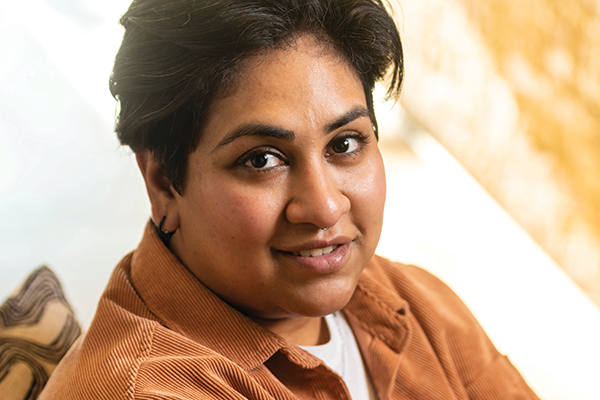
IT HELPS TO BE OUTGOING
In nearly a decade of learning, volunteering and working in Canada, Fowzia Huda has learned a few things about community involvement
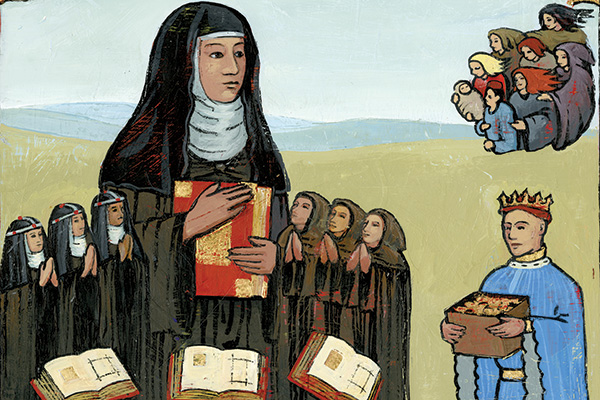
THE MOST FAMOUS ABBEY YOU'VE NEVER HEARD OF
In the 16th century, a group of nuns was remaking the way ordinary people practised their own religious devotion. An Augustana scholar reveals some surprising reasons why it’s important today.
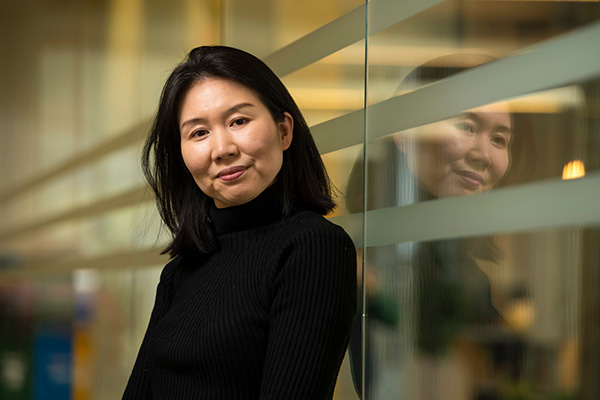
A HUMAN INTEREST STORY
The ability to explain themselves may be the most valuable trait we could build into our artificial intelligence systems.
Full Court Press
Vintage jerseys and current players
In January, we were proud to host the 2023 Basketball Alumni Day at the Games, hosted by Augustana Campus, with a special alumni VIP section. Lucky alumni who registered in advance got to enjoy free beer, cider and wings. It got us thinking about what a long tradition of sports we have at Augustana. In a moment of serendipity, we uncovered some vintage jerseys and convinced some of our current ballers to model them for us. Tarik Reed is in red, Jack Smilski is in silver and Jon Gomes is in black. Know what years these kits were in play? Let us know at augalum@ualberta.ca. – MIFI PURVIS
Meet the Teachers
In the last couple of years, Augustana Campus has hired some truly extraordinary faculty, compounding the 100-plus year legacy of a liberal arts and sciences college and a Top 5 research institution.
AS TOLD TO ANNA SCHMIDT | PHOTOGRAPHS BY JOHN ULAN
Sociologist Justin Tetrault
“I didn’t become passionate about sociology until my third year at university, where professors trained us to think critically. That experience was in stark contrast to my public-school education, where teachers taught obvious and uncomplicated answers to social issues. It drove my intellectual curiosity for understanding social issues and how we might alleviate them.
At Augustana, I have two projects where I interview people who are hard to reach for academics: prisoners and right-wing extremists. For the first project, my goal is to understand and address urgent needs and interests of incarcerated people. Our prison research team is beginning a seven-year study, researching Indigenous issues related to community reintegration, healing lodges and fetal alcohol spectrum disorder (FASD). I hope this work addresses some of the Truth and Reconciliation Commission’s Calls to Action. For the second project, I want to understand how right-wing extremists arrive at their beliefs. I hope my findings will bolster scientific and media literacy programs for kids and adults. I’m also Red River Métis and work with the Indigenous Engagement Advisory Committee to develop Augustana’s Indigenous studies program. I’m excited to involve both Indigenous and non-Indigenous students in my research.”
Animal Biologist Ivy Schoepf
“Nature constantly presents animals with challenges. My research focuses on understanding how individuals cope with the challenges of disease and competition. Deep down I have always known I wanted to be a biologist. Growing up in a small town in Italy, I made the formal decision to be a biologist at 13, when I had to apply for science high school.
While I was based in Switzerland, I collected data in Africa, spending up to 10 months at a time in the field over almost 10 years.
In 2016, I moved to Canada for my second postdoctoral appointment at Queen’s University, where I started working with birds. At Augustana, I look forward to developing my research to be truly holistic and integrative. I would like to help make field biology more inclusive. I’ve been lucky to travel to different parts of the world, meet amazing people and see unique wildlife. I would like to see more people from less affluent backgrounds afforded similar opportunities.”
Literary Historian Willow White
“Growing up, I loved to read and write. After reading Chaucer, Shakespeare, Jane Austen, and more in English 101, I changed my major from sociology to English. I study the history of women writers in English literature and theatre, focussing on English and Indigenous women writing during the “long 18th century” (about 1660 to 1830) in Britain and North America. As a feminist literary historian, I’m interested in how women navigated and resisted gender oppression long before the concept of feminism was articulated. I am interested in how Indigenous women writers resisted both patriarchy and colonialism following contact with the British Empire.
I’m a citizen of the Métis Nation of Alberta and a first-generation graduate. My parents didn’t have the support needed to attend university, but they fostered a love of learning at home. Someday I’d love to write a book about the history and cultural production of Scottish-Cree Métis (known as Countryborn) girls, women and matriarchs. I began teaching English Literature and Indigenous Studies at Augustana in 2022 after six years in Montreal. I’m grateful to have a job back in the Métis homeland and Treaty 6 territory in the fields that interest me most!”
Poet and Scholar Lucas Crawford
“I’ve always written poetry and disrupted gendered expectations, unwittingly or not. Studying these things has been a way of seeking new understandings of how to make a life for myself. So, the choices I made growing up in Nova Scotia didn’t exactly feel like choices, but I had to be very decisive about not going to med school or military college!
At Augustana, I study queer and transgender art, literature and popular culture, often with a focus on mental health and with a desire to value the arts.
People sometimes validate transgender experiences by rejecting our connection to mental illness, which is historically inaccurate and stigmatizing.
To create alternative ways of thinking about this connection, I’m studying transgender artists and writers who offer non-stigmatizing and non-medical wellness expertise. As a community-based corollary, I’m organizing a multidisciplinary team of poets who identify as mentally ill to offer free poetry workshops to survivors of psychiatric treatment and in-patients of psychiatric wards. I’m thrilled this project has received robust support from the Canada Council for the Arts. It’s a sign that attitudes toward mental illness are shifting, as is my Canada Research Chair in Transgender Creativity and Mental Health.”
Philosopher Myke Omoge
“Think about the many things you’ve come to know. Now ask yourself whether you indeed know them. In my work, I weigh and characterize our certainty with regard to what we know. I wanted to be a philosopher after taking logic and critical thinking in my undergraduate degree. I loved the simplicity and transferability. How it exposes human reason and enables proper reasoning.
Before becoming an assistant professor of philosophy and Black studies at Augustana, I was a postdoctoral fellow at the University of Toronto and the University of the Western Cape.
I grew up in a little town in western Nigeria called Igbodigo. And at Augustana, I felt at home at once. Augustana presents the opportunity to have non-philosophers as department members. I leverage findings from many fields, so my departmental colleagues’ expertise is relevant to my research.
If I had unlimited time and resources, I’d start by tidying up evolutionary theories on imagination, and centralize Africa within that theory. Creativity and other human cognitive faculties evolved in Africa, before the migration several hundred thousand years ago.”
Nueroscientist Ana Klahr
“When I grew up in Buenos Aires, Argentina, I was interested in space sciences. But I did my honours research under a psychology professor who is also a neuroscientist. I decided then that all I wanted to do was to study brains for the rest of my life. Now I study in animals what happens in patients who suffer a hemorrhagic stroke. My main goal is to find potential therapeutic targets and test the efficacy and safety of treatments.
Over 97 per cent of animal studies that test therapies for hemorrhagic stroke use solely male animals. These animals tend to be young and healthy, which is not a good representation of what happens in people with stroke.
Females are also excluded from animal research because scientists are concerned that female hormones could be a confounding factor. Given that female human patients are also underrepresented in clinical studies, we know very little about female stroke health.
I hope my research can advance our knowledge of how to treat stroke in females, not just young and healthy ones.”
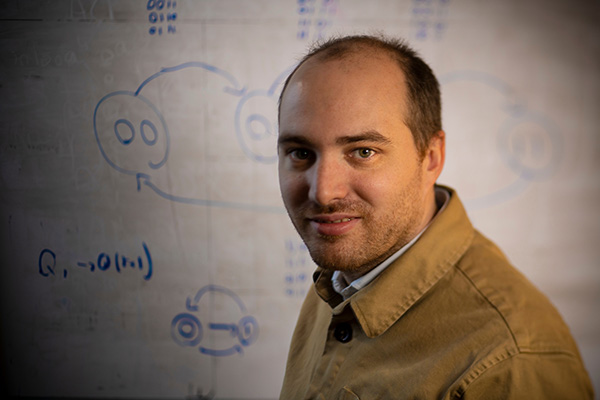
Software Engineer Thibaud Lutellier
“I loved computers when I was growing up in Angers, France. My father had one at home and I would break it apart to look inside. My brother was an engineer, so I wanted to be one, too.
With software, our expectations are lower and we tolerate a lot of problems. This matters, because software is used in critical domains. Everyone would complain if a car sometimes displayed the speed incorrectly! We need to raise the bar of what we consider acceptable quality.
My research goals are to develop techniques that put quality and reliability at the centre of software development. I help developers build high-quality software, including some that automatically detects and fixes bugs. My goal is to use AI to “hunt” software bugs.
One of the larger up-and-coming issues in my research field is fairness in software and AI. Now, working at a liberal arts and sciences campus, I can lean on my colleagues in fields where fairness has been extremely important for years.”
CLASS NOTES
We’d love to hear what you’re doing! Tell us about your new job, your latest volunteer activities, your recent vacation or your new pet. Celebrate a personal accomplishment or share your favourite campus memory. Submit your class note. Notes will be edited for clarity, length and style.
COMPILED BY MADISEN GEE, ’21 BA, ’21 CERT(CSL)
1950s
1960s
’62 Telmor Sartison, ’64 BA, and ’53 Adelene Sartison, are 85 and 86, dealing with aging but pretty “get-aroundable.” Adelene struggles with vision and health issues arising from 58 years of diabetes, while Telmor has a stent and a pacemaker — souvenirs from a heart attack and irregular heartbeat, respectively. But the pair keep their spirits up. “Life is good and full enough. We are blessed.”
’65 Don Allan, has had many career experiences since attending Camrose Lutheran College and singing in the 1964-65 New York World’s Fair with the CLC Choir. Highlights include 20 years of farming, starting a private Christian school and serving on the board of the Association of Independent Schools and Colleges in Alberta. In 1992 he moved to Victoria and was ordained as a pastor there, where he worked for 21 years. He has since returned to farming at Saanichton Farm on the Saanich Peninsula just north of Victoria. He curls six days a week, and has competed in the National Clergy Curling Championship, known as the Friars’ Briar, each year since 2012. “My wife Helen and I have been married for 54 years, have four adult children and are blessed to have eight grandchildren. “God is good! Life is great!”
’66 Daniel Johnson, ’69 BSc, ’77 MSc, and his wife, ’66 Diane Persson, ’72 BA(Hons), ’80 PhD, celebrated Christmas in Saudi Arabia with their daughter and her family this past year. Daniel volunteers with their son doing medical research in Houston, Texas, and co-authored the article, “Use of a pressure wire for automatically correcting artifacts in phasic pressure tracings from a fluid-filled catheter.”
1970s
1980s
’80 Glenys Dolinsky (Grundberg), ’82 BEd, retired from teaching to Campbell River, B.C., where she taught and retired again! She recently bought a sailboat and is loving the ocean and island life. “CLC friends are always welcome on our boat!”
’81 Renee Stieda, has been teaching in the Cowichan Valley on Vancouver Island since 2005. In 2018 she became one of three lead teachers working towards developing their classrooms into challenge-based inquiry (CBI) classrooms, which include project-based and hands-on learning. In 2016 she fulfilled a childhood dream of designing and building a house! She and her husband — who did most of the building — have enjoyed welcoming friends and family into their new home. Their blended family consists of four grown children and their partners, plus five grandchildren. When she’s not teaching or learning, Stieda works on her genealogy hobby, works in the garden and volunteers for the fundraising arm of Ducks Unlimited Canada.
’86 Nick Andrusiak retired from CN Rail last year after 36 years.
’86 Sharron Spicer (Goehring) graduated from the University of Calgary’s MD program in 1995. She works as a pediatrician at the Alberta Children’s Hospital and is an associate chief medical officer with Alberta Health Services.
’88 Deb Campanelli (Larson) celebrated 30 years with The Calgary Board of Education in 2021, having contributed to education in a variety of roles including administrator, curriculum leader, PE specialist and elementary classroom teacher). Campanelli is currently teaching first grade where her class is celebrating the publication of their 2021 book, Kindness Is Our Superpower. Campinelli is enjoying life in Calgary with one fur baby and three grown children. She treasures her time at Augustana, including great memories with the women’s basketball team, spring PE course memories with her dad, and first-year dorm roommates and friends.
’89 Cindy Escott, ’91 BEd, ’09 MEd, was named the new superintendent of Evergreen Catholic School Division in August 2022. She joined the division in 1996 where she has worked ever since as a teacher, principal, administrator, associate superintendent and most recently, deputy superintendent. In her new role, she will guide the division in its priority areas, which include wellness, quality teaching and learning, faith formation and engagement and advocacy.
1990s
’92 Ramona Parent-Boyd, BA, ’01 MSc, is following her passion for all things home with her design and organizing business, Ramona Aline Home, which she started in 2021. She is also navigating university program decisions with her daughters. “How can it be that long since I was doing the same thing?!” she writes. “A big hello to all my Augustana friends!”
’94 Lynnette Wray, BA, has remained grounded in her Augustana roots of servant leadership. She continues to serve as a director of the East Kootenay Community Credit Union and as board chair for the 2022-23 year. She has also recently been elected to Cranbrook City Council for a four-year term. She is grateful for the love and support of her husband — a dedicated high school teacher — and two kids, who are middle-school students in French immersion.
’96 Jarrett Craig, BA, is working behind the camera in the motion picture and television industry, having recently wrapped the second season of Joe Pickett. You can check out Craig’s cinematography work in season one, currently airing on Paramount Plus, or seasons 10-14 of Heartland (streaming on Netflix) where he was also the main unit cinematographer.
’99 Rachelle Balla BA, ’02 BEd, is celebrating 21 years of teaching, and still loving it.
2000s
’01 Heather Bartling (Harburn), BA, was inducted into the Alberta Schools’ Athletic Association (ASAA) Hall of Fame in 2020 for her work both as an athletic administrator in schools and for contributions to the ASAA. In 2022 she was selected as the recipient of the ASAA Lorne Wood Award, which recognizes administrators who promote and support their school’s athletic program.
’08 Sofie Forsström, BA, presented work on environmental education and stewardship in the Alberta backcountry at the 11th World Environmental Education Congress in Prague in March 2022.
’08 Lyndsay Sprado, BA, is the executive director of the United World College (UWC) National Committee of Canada. After starting out promoting Augustana as an education destination for students from out of town, Sprado feels like she’s coming full circle. In her new role, she manages the admissions, selections and financial aid assessments for all Canadians applying to the UWC movement, including Pearson College UWC. Sprado says that working for an organization that considers education to be a force for peace and sustainability feels like returning to her roots at Augustana, where she really learned the power of education to change the world. You can learn more about UWC at uwc.org.
2010s
’10 Jessica Ryan, BA, and Chris Rebus volunteer with the Alumni Student Support and Engagement Team (ASSET) at Chaplaincy’s Soup Supper. The group often helps serve dinners to on- and off-campus staff, students and community members on Tuesdays at 5 p.m.
’13 Sarah Glinski, BSc, ’18 BSc(Nutr/Food) has been working as a registered dietitian for the past four years and has recently started working as a freelance health and nutrition writer.
’13 Robert McClure, BA, ’15 MLIS, has been hired as the director of Stony Plain Public Library. He also just released a new EP with his punk band, On My Side. He enjoys extolling the value of public libraries during the week and bringing a ruckus to various music venues across western Canada on weekends.
’14 Kelly Milne Henry, BMus, has sung with two professional choirs and a punk band, had a musical in the Edmonton International Fringe Theatre Festival, composed for a university choir, recorded two choral CDs, recorded a single, got married, came out as genderqueer, got an education degree, rescued cats and played in four Dungeons & Dragons campaigns!
’14 Lori Nelson, BA, recently graduated with a Master of Professional Education in Applied Behaviour Analysis from Western University, and is working as a behaviour consultant, primarily with people with autism. In October 2022 she traveled with the Global Autism Project, a non-profit organization supporting and training professionals in Chandigarh, India. The group hopes to create lasting change with the global autistic community by investing in local leaders and entrepreneurs. You can learn more at Globalautismproject.org.
’14 Kalissa Vy, BSc, and ’14 James Vy, BSc, have kept Augustana close to their hearts after graduation. The couple got engaged in 2018 outside of Founders’ Hall on Preview Day with the help of Augustana staff, and they recently established the Vy Engagement Award for students involved in the Augustana community, which included additional donations from their wedding day. The pair recently returned from their honeymoon, where they explored Croatia and Italy.
’16 Dylan Hansen, BA, is a senior crew chief with Midwest Surveys in Lloydminster, Alta., and is still performing country and folk music.
’17 Sophia Graham, BA, is completing her master of arts in Natural Resource Management and Environmental Studies at the University of Northern British Columbia and is a recipient of the Joseph-Armand Bombardier Canada Graduate Scholarship.
’19 Isabella de Goeij, BMgt, ’19 Cert(ILS), was accepted into the University of Northern British Columbia’s Northern Medical Program. Since graduating from Augustana, de Goeij has worked as an accountant, an educational assistant and a creative intern for her favourite YouTube channel. Now, she’s starting a new adventure in medical school in Prince George, B.C. De Goeij cherishes the time she spent at Augustana, including going on the 2018 India Tour and working on community-based school projects. “Augustana is very near and dear to my heart and I thoroughly enjoyed the five years I spent studying there,” she writes. If you’re interested in learning more about her Augustana experience or the medical school application process, you can reach her at degoeij@ualberta.ca.
2020s
’20 Keely Blake, BA, is in her final year of a master’s of education program in School and Applied Child Psychology at the University of Calgary. She recently completed an eight-month internship at Foothills Academy, which specializes in teaching students with learning disabilities. There, she conducted psychoeducational assessments that explore students’ strengths and weaknesses to help create home and school plans that focus on improving school success and overall well-being. She also supports a program that teaches executive functioning skills to students with ADHD and learning disabilities. After graduating in April, she plans to register as a provisional psychologist with the College of Alberta Psychologists.
’22 Mesha Olsen, BA, was accepted into the master of science in Occupational Therapy program at the U of A’s North Campus. She packed up and moved a whopping 40 minutes north to pursue further education.
GIB'S TREE
Professor Emeritus David "Doc" Larson remembers the late Professor Emeritus Garry Gibson.
In Memoriam
Circle magazine notes with sorrow the passing of the following Augustana alumni, based on information we have received between December 2021 and January 2023.
- ’43 Blanche Wiese (Simmons)
in February 2022 - ’47 Erling Brynjulf Stolee, ’50 BSc,
in February 2022 - ’48 Andrew John Birchill, ’56 BEd,
in November 2020 - ’50 Anna Russell (Jensen)
in May 2022 - ’52 Viola Throndson (Rasmussen)
in April 2022 - ’53 Clemens Sylvanus Bernhardson, ’59 MA,
in January 2022 - ’53 Shirley Jeannotte (Snaith)
in December 2021 - ’54 Laverne Hoveland
in December 2021 - ’56 Norman D. Olson, ’58 Dip(Ed), ’60 BA,
in November 2022 - ’60 Leonard Clifford R. Schultz, ’65 BEd, ’68 BSc, ’83 Dip(Ed)
in May 2022 - ’66 Brian Wayne Hesje, ’69 BEd, ’73 MBA,
in December 2021 - ’67 John Edward Morck, ’70 BSc,
in October 2022 - ’67 Linda Mae Nichols-Mandrusiak, ’73 BEd,
in September 2022 - ’71 Kenneth William Bownes, ’73 BSc(Spec), ’75 Dip(Ed),
in December 2019 - ’71 Fred J. Nelson
in August 2022 - ’72 Brent A. Hallett
in February 2022 - ’74 Allen Andrew Jackson, ’81 BA(RecAdmin),
in January 2022 - ’84 Ian Morris Erickson, ’88 BA(RecAdmin),
in June 2020 - ’85 Christopher Scott Kieser, ’87 BCom,
in April 2022 - ’90 Deb E. de Caux
in February 2022 - ’90 Katharine Gould Horton, BA,
in October 2021 - ’92 Laura Kathleen Sorenson (Rosland), BA, ’94 BEd,
in March 2022 - ’96 Dustin Joseph Hartley, ’99 BSc(Hons), ’03 MSc,
in September 2021 - ’03 Steven Reid, BA,
in October 2022 - ’13 Jessica Audrey Hatton, BMus,
in 2022
LOWERING THE FLAG
- Vincent Erik Eriksson, Professor Emeritus, History and Religious Studies, died in 2022 at the age of 90 years. Left to cherish his memory are his wife Mary Ellen, children David, James, Jon and Bart, eleven grandchildren and eleven great-grandchildren. Eriksson was predeceased by his daughter Margaret. He was an avid gardener, baker and self-taught handyman. Eriksson taught courses in history, religious studies and philosophy at Camrose Lutheran College, later Augustana, from 1963 until he retired in 1989.
- James Neff, Professor Emeritus in the Department of Music, died in 2022. He is missed by his children Lois, Stephen and Paul, his four grandchildren and eight great-grandchildren. Jim was predeceased by his wife Jo Ann and his daughter Mary. He loved reading, hunting and fishing, growing roses and watching the Toronto Blue Jays. He taught music theory, composition, conducting and history at Camrose Lutheran College, later Augustana, where he served as director of the Augustana choir and as academic dean; he retired in 1993.
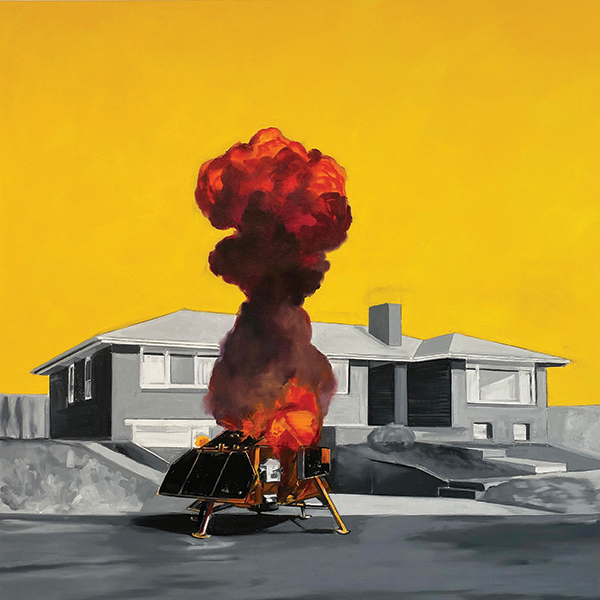
Creative Commons
“A STUDIO IS LIKE A BUBBLE OR A CAVE, in that you can stay hidden away for days and months on end,” says Julian Forrest, associate professor of fine arts and humanities. Like a lot of us, he spent time holed up in the past few years. His recent show at the Peter Robertson Gallery in Edmonton is the result. “I started painting bunkers, lunar landers, suburban bungalows and other refuges,” he says. The images are disquieting, drawing on what he calls an emotional wrestling match between a need to engage with the world and a need to engage with colour and form.
His next adventure is the opposite of holing up. In June he’s participating in the annual Arctic Circle Residency program, in which artists, scientists, architects and educators explore the high-Arctic Svalbard Archipelago and Arctic Ocean aboard a specially outfitted vessel. He applied and was selected based on his work. He recently taught a course that explored relationships between art and environmental science. “I hope that my time in the Arctic will generate further ideas for this course, as well as my research and practice in the studio.” – MIFI PURVIS
